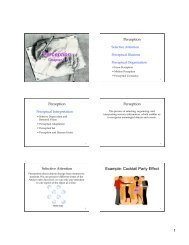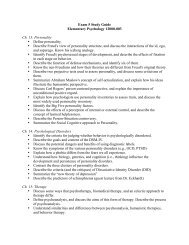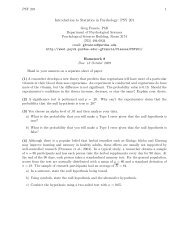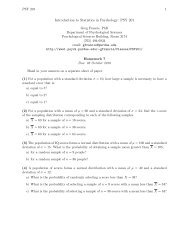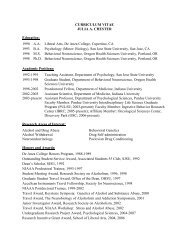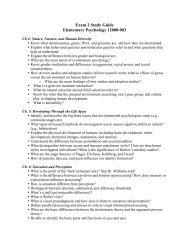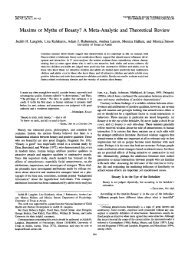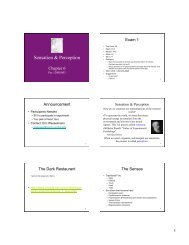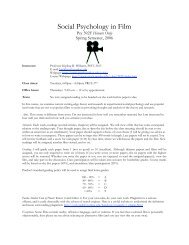Introduction to Cognitive Psychology - Department of Psychological ...
Introduction to Cognitive Psychology - Department of Psychological ...
Introduction to Cognitive Psychology - Department of Psychological ...
You also want an ePaper? Increase the reach of your titles
YUMPU automatically turns print PDFs into web optimized ePapers that Google loves.
Pr<strong>of</strong>essor Greg Francis 1/2/13Word ambiguityWord ambiguityA word by itself is <strong>of</strong>ten ambiguousConsider a parser trying <strong>to</strong> follow the phrase The plastic pencil marks...A differently designed phrase tree handles thenew word The plastic pencil marks...SSdetNPNVPWord pencil isinconsistent withstructure created!detNPANVPWord pencil isconsistent withstructure created!the plastic pencilthe plasticpencilPurdue UniversityPurdue UniversityWord ambiguityBut you run in<strong>to</strong> the same problem with theword marks (noun or verb?) The plastic pencil marks were ugly. (noun) The plastic pencil marks easily (verb)Parsers build phrase trees on the fly, sobacktracking is <strong>of</strong>ten required many times it is so fast that we do not notice seems effortlessLexical decisionIt is not effortless and it can be shown with anexperimentThe experiment is a variation <strong>of</strong> the lexical decisiontask, which you did in CogLabIn the lexical decision experiment, you see a pair <strong>of</strong>words/non-words, and we measure the reaction timefor you <strong>to</strong> decide if the second word is a word RT is faster if the second word is semantically related <strong>to</strong> thefirst wordPurdue UniversityPurdue UniversityLexical decisionThe data find that RT is faster if the second word is meaningfullyrelated <strong>to</strong> the first wordCogLab DataResults are based on data from 180 participants [Global 53,570 participants] Condition ! ! !Reaction time (ms)! Associated words ! !686 [Global: 619]! Unassociated words !685 [Global: 629]! Word then non-word !870! Non-word then word !766! Two non-words ! !871!Evidence <strong>of</strong> ambiguityWe can apply the lexical decision task <strong>to</strong> the ambiguity<strong>of</strong> parsing (Swinney, 1979)Consider the following paragraph, which subjectslistened <strong>to</strong> Rumor had it that, for years, the government had beenplagued with problems. The man was not surprised when hefound several spiders, roaches, and other bugs in the corner<strong>of</strong> his room.The word bugs is ambiguous insects vs surveillance devicesPurdue UniversityPurdue UniversityPSY 200: Intro. <strong>to</strong> <strong>Cognitive</strong> <strong>Psychology</strong> 4



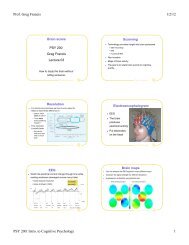

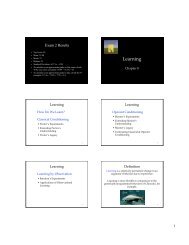
![Exam 4 Study Guide[1]](https://img.yumpu.com/45196739/1/190x245/exam-4-study-guide1.jpg?quality=85)
